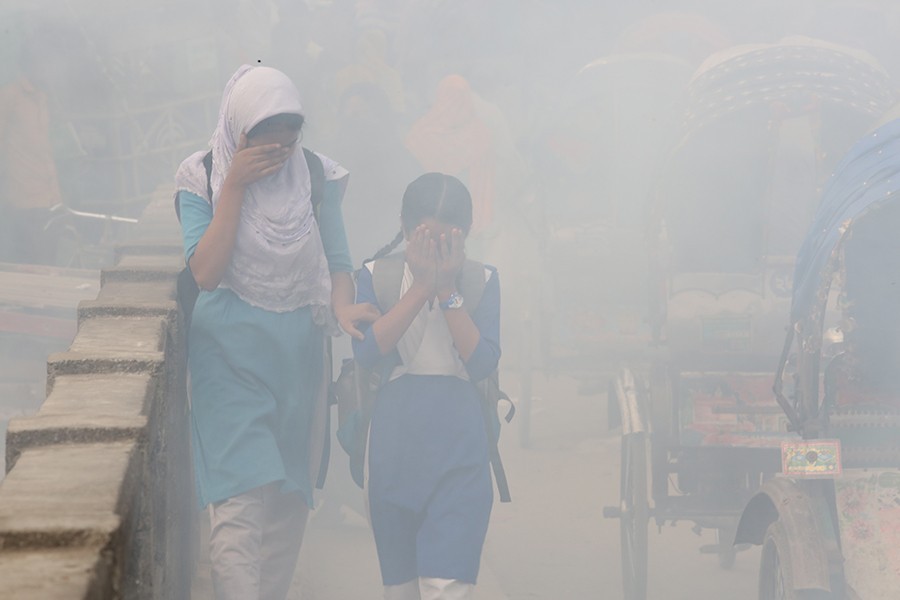
Published :
Updated :

The High Court (HC) admonished on Monday last the Department of Environment (DoE) and the two city corporations of Dhaka for their respective failures to comply with its earlier directives on controlling air pollution in the capital. This time the HC has granted the two entities time to comply with those directives before December 11, the date set for passing further order in this case. In January 2020, the first directive was issued for the DoE to shut down all the illegal brick kilns in Dhaka and its neighbouring districts---Narayanganj, Gazipur, Manikganj and Munshiganj. The second directive issued in February 2021 concerns spraying of water on city streets, including the entry points of the city, from the vehicles of the Fire Service and the Civil Defence. In the same breath, the HC castigated the city corporations for its nonchalant attitude towards containment of dengue.
Lawyer Manzil Murshid who originally filed the case in favour of the Human Rights and Peace for Bangladesh (HRPB), once again drew the HC's attention on Monday to newspaper report on 'selling certificates to operate illegal brick kilns in Savar'. In response to this, the HC bench's observation was quite interesting. Expressing its deep resentment at the repeated non-compliance of the directives issued, the HC made some significant observations. These are: 'they give permission to the owners (of brick kilns) to operate illegal brick kilns, which cause air pollution, as they are managed' by the latter. The DoE officials 'do not need fresh air because most of their children live abroad'.
Here the HC has highlighted two crucial issues ---one is the compliance or non-compliance of the instructions of the higher court and the other is the normal functioning of duty and responsibility that come with organisational positions. The other thing hinted at is the concern for self preservation. Had the DoE and city corporations performed their duties properly in the first place, the HC did not have to hear cases like this. The system of administration is malfunctioning at more points than before and hence rights bodies and individual complainants are seeking justice at the higher court as a last resort. At times the higher courts take suo motu notice of gross maladministration or injustice in society by default of individuals, organisations and authorities concerned or a free hand enjoyed by perpetrators.
While such applications of higher court's precedence over systemic anomalies and faults gives hope to ordinary people, non-compliance causes them utter frustration as this is considered a failure to uphold the sanctity of the judiciary, the higher courts in particular. Instances of this happening of late are rising in number. The HC ordered total stoppage of release of untreated industrial effluent into the Buriganga and other rivers around the capital. It also declared the rivers as 'living entities' and demanded that those be treated so.
But the ground reality is a stark contrast to the initial attempts made by the government agencies to go by the HC directives. Even a river commission was constituted and it started mapping the rivers of the country. The tanneries were relocated from Hazaribagh to Savar tannery estate. Then factories and industries located on the river banks or in their vicinity were served notice to install effluent treatment plants within a time period. In case of failure, their disposal pipes would be plugged, the authorities warned.
The fact is that the vested quarters come up with a flurry of activities after each road, waterway disaster, fire or industrial mishap until another pressing issue comes to the fore when the attention gets diverted or dissipated. Similarly, the HC's urgency of addressing issues of public interests is parried or sidestepped by the vested coteries with an ulterior motive on adoption of various delaying tactics on this or that excuse. This is intolerable. In effect, this amounts to defiance or undermining the court, people's last hope. The nation has to pay heavily for this. In recent times, partisan practitioners of law have not helped the cause of judiciary by their controversial actions on the court premise and questioning the neutrality of the higher courts.
Had the government agencies been serious about compliance of the HC directives, the Buriganga and other rivers around the capital considered its lifelines might have by now recovered from the heavy pollution causing their water look like that of a cesspool. In a civilised society, laws are made for compliance but here those are made, as if, only for mindless violation. Also, responsibilities at the individual and community levels are lacking when it comes to maintaining cleanliness of public places and facilities. Or, how can the Hatir Jheel, attributed the moniker 'lungs of the city', spew out the nauseating stench throughout the year?
The reason behind heavy air and environmental pollution that has earned the capital the infamy of the most unliveable city at times or top positions in the infamous ranking most of the year lies in the collective insensitive mindset. But if the agencies and organisations responsible for doing the cleaning job and raising public awareness deliberately allow the illegal actors to go about their nefarious business in exchange for unearned money, first they must be brought to book. They deserve no mercy.


 For all latest news, follow The Financial Express Google News channel.
For all latest news, follow The Financial Express Google News channel.